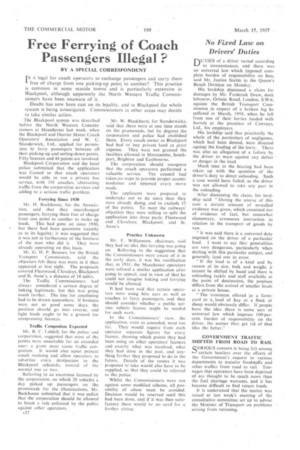Free Ferrying of Coach Passengers Illegal ?
Page 34

If you've noticed an error in this article please click here to report it so we can fix it.
BY A SPECIAL CORRESPONDENT
IS it legal for coach operators to exchange passengers and carry them I free of charge from one picking-up point to another? This practice
is common in some seaside towns and is particularly extensive in Blackpool, although apparently the North Western Traffic Commissioners have been unaware of it.
Doubt has now been cast on its legality, and in Blackpool the whole system is being investigated. Commissioners in other areas may decide to take similar action.
The Blackpool system was described before the North Western Commissioners at Manchester last week, when the Blackpool and District Motor Coach Operators' Association and W. C. Standerwick, Ltd., applied for permission to ferry passengcrS between all their picking-up and setting-down points. Fifty licences and 44 points are involved.
Blackpool Corporation and the local police. submitted that the application was framed so that coach operators would be able to run a private bus service, with 191 coaches, abstracting traffic from the corporation services and adding to a serious traffic problem.
Ferrying Since 1930 Mr. H. Backhouse, for the Association, said that they interchanged passengers, ferrying them free of charge from one point to another to make up loads. This had gone on since 1930, but there had been questions recently as to its legality; it was suggested that it was not in furtherance of the business of the man who did it. They were already operating on this basis.
Mr. G. H. P. Bearnes, for the British Transport commission,. said the objectors felt there was more in it than appeared at first sight. The proposals covered Fleetwood, Cleveleys, Blackpool and St. Anne's, a distance of 18 miles.
The Traffic Commissioners had always considered a certain degree of linking legitimate, but this was going much' farther. The line for combining had to be drawn somewhere. If business were not so good some days, the position should go into reverse. and light loads ought to be a ground for compressing licences.
Traffic Congestion Expected Mr. R. C. Liddell, for the police and corporation, suggested that most of the points were unsuitable for an extended user: a grant must cause traffic con gestion. it would also upset present coach routcing and allow operators to advertise every destination in the Blackpool schedule, instead of the normal one or Iwo.
Referring to an excursion licensed by the corporation, on which 20 vehicles a day picked up passengers on the promenade for the illuminations, Mr. Backhouse submitted that it was 'unfair that the corporation should he allowed to break a rule enforced by the polite against other operators.
s32 Mr. W. Blackhurst, for StanderwickS, said that there were at one time stands on the promenade, but by degrees the corporation and police had abolished them. Every coach owner in Blackpool had had to buy private land at great expense. They were not granted the facilities allowed in Morecambe, Southport, Brighton and Eastbourne.
The corporation should recognize that the coach operators performed a valuable service. The council had taken no steps to provide proper accommodation and opposed every move made.
The applicants were prepared to undertake not to do more than they were already doing, and to exclude 15 of the points. To meet the railways' objection they were willing to split the application into three parts: Fleetwood and Cleveleys; Blackpool; and St. Anne's.
Practice Unknown Mr. F. Williamson, chairman, said they had no idea this ferrying was going on. Referring to the suggestion that the Commissioners were aware of it in the early days, it was his recollection that, in 1931, the Manchester operators were refused a similar application after going to appeal, and in view of that he could not imagine linking and ferrying would be allowed.
Tt had been said that certain Operators were using hire cars as well as coaches to ferry passengers, and they should consider whether a public service vehicle licence might be needed for such work.
In the Commissioners' view, the application, even as amended, went too far. They would require from each operator separate figures for every licence, showing which points they had been using on other operators' licences and exactly what was involved, what they had done in the past, and anything further they proposed to do in the future. Details of the routes it was proposed to take would also have to be supplied, so that they could be referred to the police.
Whilst the Commissioners were not against some modified scheme, all possibility of abuse must be avoided. Decision would be reserved until this had been done, and if it was then satisfactory there would be no need for a further sitting.




































































































